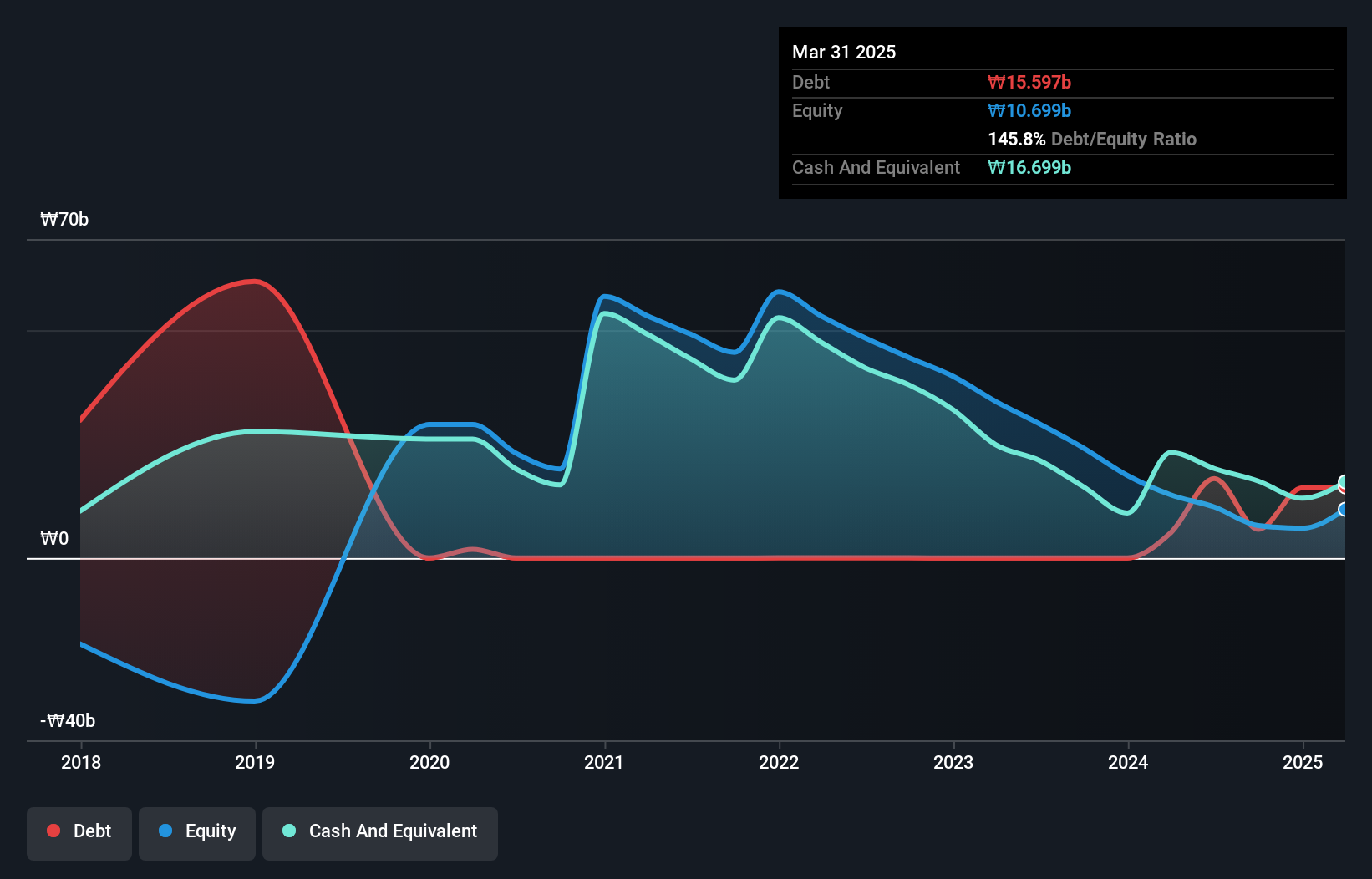- South Korea
- /
- Biotech
- /
- KOSDAQ:A317690
QuantaMatrix (KOSDAQ:317690) Has Debt But No Earnings; Should You Worry?
David Iben put it well when he said, 'Volatility is not a risk we care about. What we care about is avoiding the permanent loss of capital.' It's only natural to consider a company's balance sheet when you examine how risky it is, since debt is often involved when a business collapses. We can see that QuantaMatrix Inc. (KOSDAQ:317690) does use debt in its business. But should shareholders be worried about its use of debt?
When Is Debt A Problem?
Debt assists a business until the business has trouble paying it off, either with new capital or with free cash flow. Ultimately, if the company can't fulfill its legal obligations to repay debt, shareholders could walk away with nothing. While that is not too common, we often do see indebted companies permanently diluting shareholders because lenders force them to raise capital at a distressed price. Having said that, the most common situation is where a company manages its debt reasonably well - and to its own advantage. When we examine debt levels, we first consider both cash and debt levels, together.
What Is QuantaMatrix's Net Debt?
As you can see below, at the end of March 2025, QuantaMatrix had ₩15.6b of debt, up from ₩5.57b a year ago. Click the image for more detail. However, its balance sheet shows it holds ₩16.7b in cash, so it actually has ₩1.10b net cash.

How Healthy Is QuantaMatrix's Balance Sheet?
The latest balance sheet data shows that QuantaMatrix had liabilities of ₩2.76b due within a year, and liabilities of ₩17.0b falling due after that. On the other hand, it had cash of ₩16.7b and ₩637.6m worth of receivables due within a year. So it has liabilities totalling ₩2.42b more than its cash and near-term receivables, combined.
Given QuantaMatrix has a market capitalization of ₩58.4b, it's hard to believe these liabilities pose much threat. However, we do think it is worth keeping an eye on its balance sheet strength, as it may change over time. Despite its noteworthy liabilities, QuantaMatrix boasts net cash, so it's fair to say it does not have a heavy debt load! There's no doubt that we learn most about debt from the balance sheet. But it is QuantaMatrix's earnings that will influence how the balance sheet holds up in the future. So if you're keen to discover more about its earnings, it might be worth checking out this graph of its long term earnings trend.
View our latest analysis for QuantaMatrix
In the last year QuantaMatrix had a loss before interest and tax, and actually shrunk its revenue by 22%, to ₩2.7b. To be frank that doesn't bode well.
So How Risky Is QuantaMatrix?
We have no doubt that loss making companies are, in general, riskier than profitable ones. And in the last year QuantaMatrix had an earnings before interest and tax (EBIT) loss, truth be told. Indeed, in that time it burnt through ₩14b of cash and made a loss of ₩20b. But at least it has ₩1.10b on the balance sheet to spend on growth, near-term. Overall, we'd say the stock is a bit risky, and we're usually very cautious until we see positive free cash flow. When analysing debt levels, the balance sheet is the obvious place to start. But ultimately, every company can contain risks that exist outside of the balance sheet. For instance, we've identified 2 warning signs for QuantaMatrix that you should be aware of.
At the end of the day, it's often better to focus on companies that are free from net debt. You can access our special list of such companies (all with a track record of profit growth). It's free.
Valuation is complex, but we're here to simplify it.
Discover if QuantaMatrix might be undervalued or overvalued with our detailed analysis, featuring fair value estimates, potential risks, dividends, insider trades, and its financial condition.
Access Free AnalysisHave feedback on this article? Concerned about the content? Get in touch with us directly. Alternatively, email editorial-team (at) simplywallst.com.
This article by Simply Wall St is general in nature. We provide commentary based on historical data and analyst forecasts only using an unbiased methodology and our articles are not intended to be financial advice. It does not constitute a recommendation to buy or sell any stock, and does not take account of your objectives, or your financial situation. We aim to bring you long-term focused analysis driven by fundamental data. Note that our analysis may not factor in the latest price-sensitive company announcements or qualitative material. Simply Wall St has no position in any stocks mentioned.
About KOSDAQ:A317690
Medium-low risk with worrying balance sheet.
Market Insights
Community Narratives



